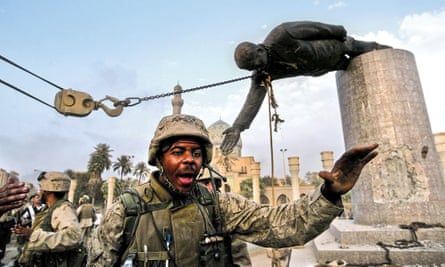20 years on, memories of the Iraq war may have faded, but it shaped the diminished UK we know today

That politics is a dark art is a cliche, but the events of 2003 helped to destroy public trust in government
P
But now, an uneasy anniversary arrives. Next Monday will mark 20 years since the invasion of Iraq: a reminder not just of Blair et al’s responsibility for the greatest political and humanitarian disaster the UK had been involved in since the second world war, but a moment when the supposed political centre ground suddenly lurched somewhere reckless and catastrophic. Support for the invasion, let us not forget, also enveloped the Conservative party, and the vast majority of the British press. In that sense, the anniversary is a vivid reminder of the perils of groupthink, and the grim results of squeezing complex realities into simple narratives.
In a deeply scarred, crisis-prone Iraq – and the wider region – people still live with the consequences as a matter of everyday experience. Here, by contrast, most of us have the awful luxury of thinking of the war as a distant, fading set of events. Only last week, a columnist in the Financial Times mused that “within the western world, the Iraq war has left little trace”, and that the invasion “didn’t shake politics”. But an episode as significant as this was always going to have profound effects on the UK, thanks to the war’s sheer disastrousness, and the fact that the case for our involvement soon turned out to have had no basis in fact. The result was a crisis of public trust that festers on.
There was an early sense of this in February 2003, when more than a million people arrived in London to demonstrate their opposition to a war that felt more likely by the hour. Pick through reports that day, and one thing in particular burns through: a sense that politics and power had lurched away from the public, and left a huge and very uneasy gap. Quotes to that effect were gathered by the dozen: “Something’s happened recently, to me and so many friends – we just know there’s something going wrong in this country. No one’s being consulted”; “This is not about party politics, but a simple feeling that democracy has been forgotten.”

Less than a month after the invasion began, the Iraqi capital apparently fell to US forces, and millions of us were told once again that we were simply wrong. But anyone who remembers the war will be familiar with what happened next: endless violence, huge levels of death, the horrors perpetrated by US personnel at the Abu Ghraib prison, and so much more. Then, in October 2004, the most breathtaking news of all was coughed out.
The BBC put it succinctly: “Iraq had no stockpiles of biological, chemical or nuclear weapons before last year’s US-led invasion, the chief US weapons inspector has concluded.”
In 2005, Blair won an election with the support of less than a quarter of the electorate, and Labour’s Commons majority fell from 167 seats to 66. “There is little doubt that historians will look back on the 2005 election as the Iraq election,” said the Guardian. When the SNP defeated Labour in the Scottish elections of 2007 and that country’s politics underwent a watershed change – just as Blair stepped down – it happened partly because the SNP’s then leader, Alex Salmond, had successfully tapped into huge anger about the war, baldly accusing Blair of lying (as one academic study put it, “voter problems with Westminster were responsible, with some dissatisfaction with the performance and leadership of the UK government and also with the issue of Iraq”).
The financial crash came a year later, followed by further proof that politics was now in an unstable and volatile state: 2010 saw the flurry of support for the Liberal Democrats known as “Cleggmania”, and the election of a hung parliament. And then came a run of seismic shifts: the rise of Ukip, the Scottish independence referendum of 2014 and the election as Labour leader of Jeremy Corbyn – whose reputation for a supposedly righteous kind of politics was rooted in his opposition to the Iraq adventure. The right was speeding down the isolationist and parochial road that led to Brexit, while the left embraced the kind of ideas that Blair had always warned against. Whatever political story I was covering during this period, I heard the same refrains from voters: bitter verdicts on his time in office, and dismissals of politicians as liars. Iraq was hardly the sole reason for this, but it was always present and correct.
The idea of politics as a mendacious trade is an ancient cliche, but in this instance, people were not wrong. Next week’s anniversary, in fact, ought to serve as a reminder of the three deceptions so central to the politics of the war, and the public disaffection they triggered. It was hardly a revelation, but the 2016 Chilcot report confirmed it: Blair and his aides presented weak and patchy intelligence as authoritative evidence of Iraq’s weapons of mass destruction. He repeatedly assured the country that no decision about whether or not to go to war had been taken, but his assurance to Bush in July 2002 that “I will be with you, whatever” suggested that his mind had long since been made up.
Then, as the invasion loomed and the UN security council considered its options, Blair said that “the French position is that France will vote no, whatever the circumstances”, whereas President Jacques Chirac had said something very different: that UN weapons inspectors needed to be given more time, and if Iraq did not cooperate, “regrettably, the war would become inevitable. [But it] isn’t today.”
Our memory of these deceptions may have faded, but their effects ripple on. Iraq hideously sullied Blair and Brown’s domestic record and marked the end of the New Labour vision of Britain as a young, confident country. It reduced the fantasies of “liberal interventionism” to ash, and deepened the disaffection and unease that would lead to our exit from Europe.
For the people now in charge of the two main Westminster parties, there may be comfort in the idea that we might somehow return to being the comparatively quiet, orderly, outward-facing nation we were 20 years ago. But there is no going back there, and the horrors and political contortions of the war are one of the key reasons why.
John Harris is a Guardian columnist


